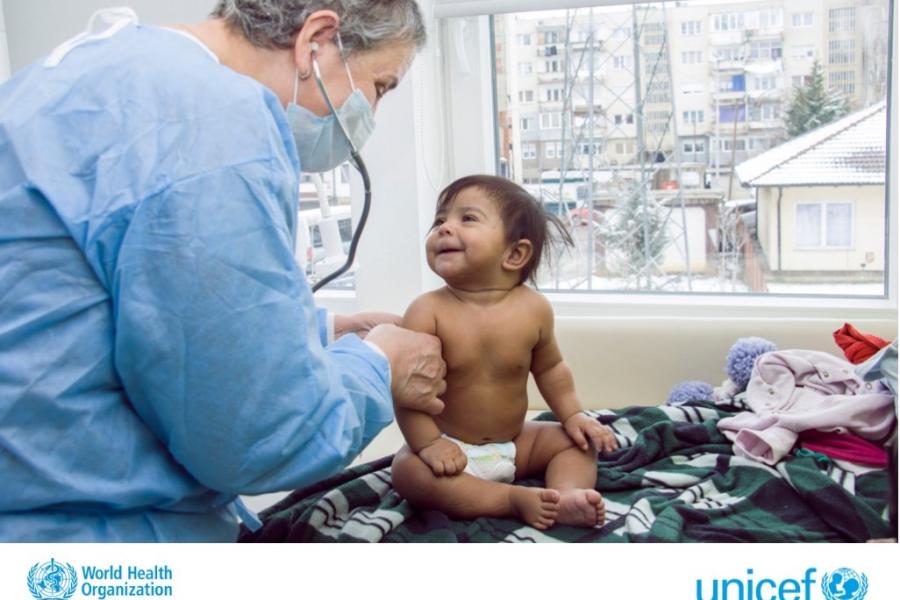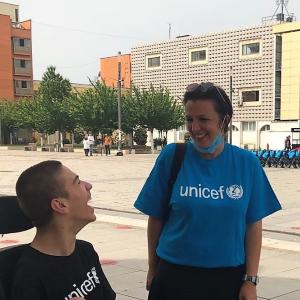World Immunization Week 2022: #Long Life For All
26 April 2022
UNICEF and WHO call for intensified efforts to make sure everyone in Kosovo is covered with their critical vaccinations

World Immunization Week – celebrated every year during the last week of April – brings together partners across the world to promote the use of vaccines that protect people of all ages against disease. Spearheaded by the United Nations Children’s Fund (UNICEF) and the World Health Organization (WHO), the theme for this year’s World Immunization Week is #LongLifeForAll.
This year’s theme highlights the immense historic achievements of vaccinations across the globe. For over two centuries, vaccines have helped protect children and adults from serious and deadly diseases. Vaccines are among the most advanced achievements of modern science, decreasing by half infant mortality and saving millions of lives throughout the world.
While recognizing the seismic historical impact of vaccines, the world is also at a crossroads currently. Globally, COVID-19 put a huge strain on health systems and services, which now threatens to reverse years of hard-won progress on routine immunizations around the world, including in Kosovo. An alarming 23 million children worldwide missed out on their vaccinations in 2020. This number can only be reduced through a greater commitment to and investment in immunization services by all.
Kosovo still has significant vaccination gaps for routine immunizations. Only three in four children or 73 per cent of children in Kosovo are fully immunized[1] as per the national immunization schedule. And even more concerning are the striking inequalities that the data highlights, as the same percentage – children fully immunized – is only 38 per cent for children from the Roma, Ashkali and Egyptian communities, with more than half missing some of their critical immunizations.
To minimize the impact of COVID-19 on routine immunizations, especially among vulnerable groups, UNICEF in collaboration with the National Institute of Public Health conducted a door-to-door campaign to identify children who had missed their vaccinations. During a little over a year, a total of 6,300 children – the majority of them from Roma, Ashkali and Egyptian communities – were supported to be vaccinated by Family Medicine mobile vaccination teams through the campaign.
Since early 2021, the UN has also been closely involved with the Ministry of Health in supporting Kosovo with the COVID-19 vaccination planning and rollout, including the training of healthcare professionals and setting up of specific vaccination sites. Despite the collective effort, with 50 per cent vaccination coverage as of date (at least one dose), Kosovars are urged to increase the COVID-19 vaccination rate to protect themselves from potential serious illness.
As one of the most cost-effective health interventions, WHO and UNICEF emphasize that vaccination is a cornerstone of universal health coverage and vital to achieving optimal health for all, everywhere. Every opportunity should be sought to vaccinate children and adults as per the routine immunization calendar. All WHO pre-qualified vaccines are safe and efficient.
About UNICEF and WHO:
UNICEF and WHO work with authorities in over 190 countries, territories and areas to strengthen national health and immunization programmes, including in Kosovo.
For further information, please contact:
Dafina Zuna, UNICEF Kosovo, Tel: +383 44 185 123, dzuna@unicef.org
Edita Haxhiu, WHO office, Pristina, Tel: +383 44 155 635, haxhiue@who.int
[1] According to the Multiple Indicator Cluster Survey, Kosovo Agency of Statistics and UNICEF 2020. The number represents the percentage of children aged 24–35 months who had received all the vaccinations recommended.





